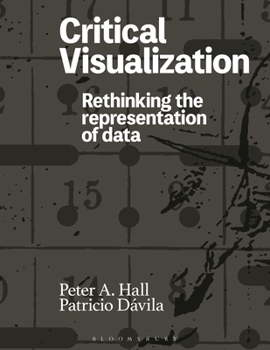Critical Visualization: Rethinking the Representation of Data
Select Format
Select Condition 
Book Overview
Information may be beautiful, but our decisions about the data we choose to represent and how we represent it are never neutral. This insightful history traces how data visualization accompanied modern technologies of war, colonialism and the management of social issues of poverty, health and crime. Discussion is based around examples of visualization, from the ancient Andean information technology of the quipu to contemporary projects that show the fate of our rubbish and take a participatory approach to visualizing cities. This analysis places visualization in its theoretical and cultural contexts, and provides a critical framework for understanding the history of information design with new directions for contemporary practice.
Format:Hardcover
Language:English
ISBN:1350077232
ISBN13:9781350077232
Release Date:December 2022
Publisher:Bloomsbury Visual Arts
Length:256 Pages
Customer Reviews
0 rating





